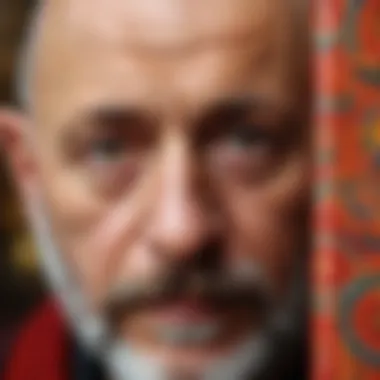Analyzing Boris Akunin's Latest Literary Exploration


Intro
Boris Akunin's literary prowess is well known among fans of Russian literature. He has managed to carve a niche for himself with rich narratives and multifaceted characters. The latest work from this celebrated author invites readers to delve into a world layered with meaning and social undercurrents. This exploration will shed light on various components that contribute to the significance of his new creation, examining thematic intricacies, character arcs, and narrative frameworks, alongside the socio-political nuances that invigorate his writing.
Основные жанры литературы
Boris Akunin’s contributions span multiple genres—mystery, historical fiction, and even elements of psychological drama can be found in his works. Understanding these genres is vital for interpreting his new book. The following sections outline the classifications and defining features of the genres that resonate in Akunin's narratives.
Классификация по жанрам
- Historical Fiction: Akunin often crafts stories that hinge on actual historical events, weaving a rich tapestry that blends fact and fiction. His explorations of the past serve not just as a backdrop, but rather as a catalyst for character development and thematic exploration.
- Mystery/Detective Fiction: Renowned for his intricate plotting, Akunin keeps readers on the edge of their seats. His protagonists, often detectives, navigate complex cases that reveal the darker sides of human nature and society.
- Psychological Drama: Certain characters reflect profound internal struggles, making for a rich emotional landscape. Akunin dives into the psyche, pushing readers to engage with the multilayered dimensions of his creations.
Особенности каждого жанра
In each genre, certain key elements come into play:
- Historical Fiction: The accuracy of historical detail is paramount. Akunin's meticulous research breathes life into the settings, making them almost palpable. This precision enhances reader immersion.
- Mystery/Detective Fiction: The art of misdirection and suspense is masterfully handled, drawing readers deeper into the narrative web. Clues are dropped artfully, encouraging an analytical reading experience.
- Psychological Drama: Character motivations are explored with richness, transforming the narrative into a study of human complexity. Akunin's insight into human behavior captivates and often challenges readers.
Рецензии на книги
Reviews play a crucial role in understanding a work's reception and impact. Passwords to an author's mind, critiques of Akunin's books reveal not just personal viewpoints but collective societal reflections as well.
Обзор популярных книг
Within Akunin’s oeuvre, several titles stand out, such as The Turkish Gambit and The State Counsellor. Each has garnered attention for varying reasons—from their compelling plots to the depth of their characters.
Анализ литературных произведений
When examining these works, we can see threads of recurrent themes such as loyalty, betrayal, and the often murky landscape of morality. Each of these titles serves as a case study, offering insights into Akunin’s evolving creative journey. As literary scholars and enthusiasts engage with these texts, they uncover layers of significance that reflect both individual and collective experiences.
"An author's journey can often be viewed as a mirror reflecting not only their personal experiences but also society's complexities."
In synthesizing Akunin's latest contributions and the classics that preceded them, we aim to generate a deeper understanding of his literary ramifications. Exploring the duality of the self—both as a character and as a creator—allows for a richer appreciation of his work.
Preface to Boris Akunin's Latest Work
Boris Akunin, a name synonymous with modern Russian literature, has continually pushed boundaries, and his latest offering is no exception. This section is pivotal as it lays the groundwork for understanding not only the new book itself but also the broader implications of his work in contemporary writing. In the intricate world of storytelling he creates, readers can find the interplay of historical context, nuanced themes, and complex characters. The work invites both curiosity and critical thought, making it essential for enthusiasts and scholars alike.
Author Background
Boris Akunin, born Grigory Shalvovich Chkhartishvili, is a figure who has keenly observed and chronicled Russian society through the lens of fiction. Growing up during the Soviet era, he experienced firsthand the cultural and political shifts that have shaped modern Russia. An enthusiast of both classic literature and detective novels, Akunin sought to blend these influences into a unique style that appeals to a diverse readership. His education at the Georgian State University and studies in Japan have enriched his narrative techniques, allowing him to weave intricate plots that reflect deeper truths about human nature.
Overview of Previous Works
Akunin's previous works, most notably the Erast Fandorin series, showcase his flair for historical fiction mingled with mystery. Each book crafted in this series delves into a specific historical period, with meticulous attention to detail that transports readers into another time. His books such as "The Winter Queen" and "The State Counsellor" have been praised for their inventiveness and depth. These narratives not only provide thrilling plots but also offer social commentary, enriching the reader's experience. The dialogue is often laced with irony, mirroring the complexities of Russian identity and culture.
Expectations Surrounding the New Release


As anticipation builds around the release of Akunin's latest book, enthusiasts and critics alike have set high expectations. Readers are eager to see how he builds upon his previous themes. Will he delve deeper into the socio-political undercurrents that influence his characters? What new narrative techniques will he employ? Given his history of merging historical and personal narratives, it is reasonable to expect that this new work will challenge conventional storytelling methods while offering insights into the complexities of modern life. A growing trend in literary circles is a focus on mental health, and many wonder how Akunin might address this within his narrative structure, potentially reflecting on contemporary issues that resonate with today’s audience.
"Akunin’s work has always been a mirror reflecting the complexity of Russian culture, history, and identity."
Thematic Exploration
In the latest work of Boris Akunin, thematic exploration serves as a cornerstone of the narrative. Themes underpin the entire text, offering depth and richness that resonate with readers. Through a meticulous examination of the prominent themes within the book, we uncover the layers of meaning that Akunin weaves into his storytelling.
A well-structured thematic exploration fosters connection and reflection. This is particularly valuable in understanding how the book interacts with contemporary issues and timeless questions of human existence. The themes not only define character motivations but also set the stage for conflict and resolution, driving the narrative forward in a compelling manner.
Core Themes
At the heart of Akunin's latest narrative lies a tapestry of intricate themes. Love, loss, power dynamics, and moral ambiguity swirl together, creating a rich narrative landscape. Each theme complements one another, illustrating the complexity of human nature and society. For instance, the theme of moral ambiguity challenges the notion of clear-cut good versus evil; characters struggle with their decisions that often straddle the line between right and wrong. This theme prompts readers to reflect on their own values and ethics.
Additionally, self-discovery emerges as a vital thread. Characters embark on not just physical journeys but internal quests that lead to transformation. Through these struggles, readers witness characters’ growth and their evolution—a journey that mirrors the reader’s own experiences in unexpected ways.
Interplay of History and Fiction
Akunin masterfully intertwines history with fiction, enriching the narrative while making it compelling and thought-provoking. Historical events provide a backdrop against which the story unfolds, making both characters and their struggles more relatable. By embedding real historical context within fictional plots, Akunin invites readers on a journey through time. This technique not only serves to educate but also shapes the characters' worldviews and choices.
Readers see characters grappling with the shadows of their past, reflecting historical truths that resonate deeply with modern society. This interplay evokes a sense of the cyclical nature of history—how past events can echo through the present. Thus, every choice and consequence in the narrative gains weight as readers ponder the impact of history on individual lives.
Socio-Political Commentary
Akunin does not shy away from delving into socio-political commentary, providing sharp insights into contemporary issues. Through the lens of his characters' journeys, he examines themes such as authority, oppression, and social class disparities. In doing so, he encourages readers to critique the structures of power in society.
The nuanced portrayal of characters reflects diverse perspectives, allowing for a multifaceted examination of societal norms and challenges. For example, a character from an impoverished background may confront the stark realities of class division, bringing attention to systemic inequality. By weaving such commentary into the narrative fabric, Akunin elevates the story beyond mere entertainment—he crafts a profound reflection on humanity's ongoing struggles.
Character Analysis
The character analysis is a crucial part of understanding Boris Akunin's latest work. Through his sophisticated character portrayals, the author manages to dive deep into human complexities, emotions, and moral dilemmas that resonate with readers on various levels. This section aims to unpack the intricate relationships and transformations that take place within the narrative, revealing how Akunin employs his characters not merely as vehicles for the plot but as reflections of broader societal themes.
Protagonists
In Akunin's new work, the protagonists are crafted with a level of detail that invites readers into their minds and motives. Each character begins their journey with unique backgrounds and personal challenges, which serve to anchor them in a believable reality. For instance, one protagonist might be portrayed as a disillusioned detective grappling with the shadows of a troubled past while seeking redemption through solving a series of mysteries. This blend of personal conflict and overarching narrative drives the reader to invest in their journey.
The depth of these protagonists often becomes evident through critical turning points in the story. Readers witness not just a sequence of events, but rather a transformation spurred by their choices. The emotional weight carried by these characters allows readers to relate, emphasizing that everyone has their burdens to bear. This is perhaps Akunin's forte — capturing the essence of humanity in its richness and flaws.
Supporting Characters
Akunin does not rely solely on his main characters to push the narrative forward; instead, the supporting characters offer vital texture and nuance to the storyline. While they may not have as much page-time, their roles are significant in shaping the protagonists' experiences. For example, a mentor figure might provide wisdom and guidance, but the underlying tension in their relationship can create obstacles that test the protagonist's resolve.
Furthermore, the supporting characters often symbolize societal constructs or archetypes. This is not just a casual observation, but rather a calculated decision by Akunin, who seems intent on drawing parallels between his fictional world and contemporary issues. By examining the dynamics between the heroes and their supporting casts, readers can glean insights into societal norms, expectations, and pressures that shape individuals within the larger context.
Character Development Arcs
Character development arcs in Akunin's new release are a deliberate dance of evolution and revelation. Each arc is tied intricately to personal growth, revealing how experiences mold individuals over time. For instance, a character who starts in a position of ignorance may see the world in a stark new light after a series of tough choices forces them to confront their beliefs.


This notion of change is what makes the narrative not just entertaining but thought-provoking. As characters grapple with challenges, they evolve in ways that often mirror the complexities of real life. The exploration of these arcs is not limited to grand transformations; sometimes, the most subtle shifts in perspective lead to the most profound insights.
"A strong character arc doesn’t just drive the plot, it molds the reader’s understanding of the very fabric of the narrative."
The interplay between past experiences and current decisions provides a rich ground for examining how one's past is never truly left behind; instead, it lingers, influencing the paths that characters choose. Through this lens, Akunin's exploration of character becomes not merely a literary tool, but a reflection of the universal human experience.
Narrative Techniques
Narrative techniques play a crucial role in the literary tapestry Boris Akunin weaves in his latest work. By adeptly manipulating the mechanics of storytelling, Akunin enhances the reader's engagement and guides them through the intricate layers of his narrative. These choices add depth, allowing readers to experience not just events but emotions and thoughts that lie beneath the surface.
Point of View Choices
In this latest endeavor, Akunin’s choice of point of view is strategic, providing unique insights into his characters' psyches. When a narrative unfolds from a third-person perspective, for instance, readers can observe the juggling of multiple viewpoints, experiencing the multifaceted nature of his world. As a reader, you might find yourself oscillating between different characters' experiences, gathering a comprehensive understanding of their inner conflicts. This method not only enriches character development but also promotes empathy among readers, drawing them deeper into the story. Essentially, point of view shapes how the audience relates to each character, allowing their motives and fears to resonate powerfully.
Use of Flashbacks
Akunin employs flashbacks deftly throughout the narrative, enabling readers to grasp significant backstories that inform current happenings. This technique feels like peeking through a keyhole in time, offering glimpses of pivotal moments that have molded the characters. It fills out the canvas of the narrative, adding layers of complexity that drive home the point that understanding the past is vital to comprehending the present. Flashbacks not only elevate tension but also build intrigue, leaving readers eager to piece together the entirety of the story. Flashbacks create a rhythm, a push and pull that mirrors the characters’ struggles, making their journeys resonate at a deeper emotional level.
Symbolism and Motifs
Symbolism and motifs serve as the heartbeat of Akunin's narrative structure. He deftly weaves symbols throughout the storyline, acting as silent characters that speak volumes. Consider the recurring motif of water—whether in the form of rain washing away sins or rivers representing the flow of time—each instance draws attention to the broader themes of renewal and the transitory nature of life.
Akunin's knack for symbolism does not merely embellish the narrative; it serves to anchor reader interpretation. Every small detail contributes to the larger picture, demanding attention and sparking curiosity. Discovery of these elements often rewards attentive readers, offering insights that elevate mere entertainment into a thoughtful exploration of life and literature.
"Akunin’s latest work is not just a mere story, but rather a landscape of interconnected symbols and emotions that invites reflection."
Through these narrative techniques, Akunin cultivates a rich, immersive reading experience. Readers are not just spectators but active participants in a dialogue that crosses the boundaries of time, culture, and thought. The careful integration of these methods leads to a deeper understanding of the characters and themes, affirming the notion that storytelling goes beyond mere words on a page.
Cultural References and Influences
In exploring Boris Akunin's latest work, one cannot overlook the cultural references and influences that permeate his narratives. Recognizing these elements not only enhances comprehension but also underscores why Akunin remains a titan in contemporary literature. By weaving together various cultural strands, Akunin creates a complex tapestry rich in significance, providing readers with layers of meaning that go beyond the surface of the story.
Literary Influences
Akunin stands on the shoulders of literary giants, drawing inspiration from an array of sources, many of which are woven seamlessly into his storytelling. While his style is distinct, echoes of Anton Chekhov resonate with his intimate character studies, and the cleverness of Mikhail Bulgakov can be seen in the way he marries the absurd with the profound. Yet, he takes these influences a step further. Subtle nods to works by Dostoevsky may allude to the moral conflicts that his characters often face, creating a dialogue between past and present in his narratives.
Moreover, references to detective fiction luminaries such as Arthur Conan Doyle appear, infusing elements of mystery and suspense—key driving forces in his novels. It’s not just homage; it’s a conversation that Akunin fosters with his readers, inviting them to recognize these influences while navigating his intricate plots.
Historical Context
The historical context in which Akunin writes adds another layer to the cultural references embedded in his work. Writing from the unique vantage point of post-Soviet Russia, he taps into the collective memory of a society in flux. The cultural artifacts, traditions, and ideologies presented in his novels reflect the struggles and transitions faced by modern Russians. This is especially salient as Akunin tends to juxtapose historical events with fictional narratives, emphasizing their interdependent nature.
For example, his explorations of Russian history typically expose the stark realities of life during different eras. By peppering his stories with diverse historical details, he not only educates his audience but also ignites a sense of nostalgia. Readers may find themselves grappling with challenges that echo historical struggles—sparking discussions about identity and heritage that are universal in scope.
Modern Reception in Literary Circles
As for modern reception, Boris Akunin’s work has been met with a mix of critical acclaim and scholarly inquiry. Literary circles have taken note of how his nuanced narratives challenge traditional storytelling norms, making him a figure of interest among academics and casual readers alike. His adept blending of genres—detective fiction, historical narrative, and psychological drama—has garnered a following and punishment Based on his narrative style, creating curiosity among critics and enthusiasts who now analyze his influences and cultural commentaries at various forums.


Many discussions around Akunin's work take place on platforms like Reddit and literary blogs, where readers dissect themes, characters, and historical nuances. Online communities emerge, sharing fan theories and speculative discussions about directions in which his narratives may go.
"This remarkable interplay between fact and fiction invites profound reflection on the nature of reality as presented by Akunin."
In summation, it's clear that the cultural references and influences within Akunin's latest work are not mere embellishments; rather, they form the backbone of his literary identity. By drawing upon literary traditions, embedding historical context, and engaging with modern reception, he crafts narratives that resonate deeply with a wide audience, linking past and present in profound and insightful ways.
Critical Reception
Critical reception is a vital aspect of understanding the impact of Boris Akunin's latest work. It not only reflects how literary critics perceive the book but also sheds light on its cultural relevance and significance within the broader literary landscape. The discussions surrounding initial reviews, comparative analyses with other authors, and the diverse reader responses all contribute to a well-rounded appreciation of the text. This section delves into the initial reviews of the book, how it stands against the works of Akunin's contemporaries, and the myriad perspectives from readers who engage with the narrative.
Initial Reviews
Initial reviews of Akunin's new book have poured in from both established critics and enthusiastic literary bloggers. Many herald it as a masterpiece, highlighting Akunin's signature blend of historical nuances and intricate storytelling. Critics have been quick to note the book's compelling narrative pace while praising the depth of its characters.
Some reviewers indulge in vivid descriptions of the book’s landscapes, claiming that Akunin paints his settings with a brush that elicits imagery straight from the golden era of Russian literature. For instance, the cultural elements woven throughout the storyline serve as an homage to classic authors, yet they retain a contemporary flair that makes them relatable.
However, not all critiques have been universally laudatory. Some assert that certain plot devices feel somewhat predictable or clichéd. These mixed reviews reveal a divided opinion on the new release's effectiveness, prompting a lively conversation among literary circles.
Comparative Analysis with Peers
Akunin's work is often placed alongside that of his contemporaries, such as Lyudmila Ulitskaya and Victor Pelevin. Their narratives, while dealing with rich themes of identity and history, vary significantly in style and execution.
Consider how Ulitskaya threads personal narratives with historical context, often focusing on intimate portraits of her characters. In contrast, Akunin takes a more sweeping approach, preferring broader strokes that encompass historical events while delving into personal dilemmas. This difference in narrative style can help readers appreciate the distinct contributions of each author to Russian literature.
By examining the thematic overlaps and differences, one can better understand how Akunin positions himself within the literary framework. Many critics argue that, while his narratives are often dynamic, they sometimes lack the emotional gravitas found in Ulitskaya's works.
Reader Responses
Reader responses to Akunin's latest work range widely, reflecting diverse tastes and literary expectations. Many readers express a genuine admiration for the intricate plots and character complexities. For instance, discussions on Reddit often spark debates about the motivations behind the protagonists’ choices, showing how engaged readers are with the intricacies of the narrative.
However, there are voices of dissent as well. Some readers find the pacing inconsistent and occasionally tiresome. This divide is made apparent in social media conversations, where users on platforms like Facebook share their reading experiences, revealing a spectrum of reactions.
Ultimately, reader feedback provides a glimpse into how the book resonates with its audience. It enriches the literary discourse, confirming that art, in any form, is subjective. 🎭
In summary, the critical reception of Boris Akunin's latest work opens doors to varied interpretations, setting the stage for its ongoing relevance in modern literature.
Concluding Thoughts
In this section, we reflect on the intricate journey through Boris Akunin's latest work, examining its themes, characters, and overarching narrative. Conclusively, this piece is not merely another addition to Akunin's repertoire; it represents a significant milestone in his storytelling evolution. The importance of analyzing this work lies in understanding how it interweaves complex socio-political commentaries with vivid character arcs, enriching both the reading experience and the broader literary landscape.
Overall Impact of the Book
The overall impact of this book is multifaceted. On one hand, it showcases Akunin's continued mastery over narrative construction, with each twist and turn compelling readers to delve deeper into the text. Readers are treated to a well-paced story that carries the essence of both entertainment and enlightenment. The character development is another vital aspect, with protagonists and supporting cast displaying emotional depth and resonance. This allows readers to connect not just with the storyline but also with the underlying societal issues depicted. The result is an engaging tapestry that speaks to both literary aficionados and casual readers alike.
Future Directions for Akunin
Looking ahead, Boris Akunin appears poised to explore even broader narrative horizons. His latest work hints at future themes that may delve into contemporary issues within Russian society, resonating with current global discourse. As he continues to blend historical elements with fictional storytelling, future works may feature increasingly intricate plotlines or even venture into new genres. By integrating more diverse influences, Akunin can further broaden his narrative scope and engage an even wider audience. The literary community no doubt anticipates what groundbreaking ideas he might introduce next.
Legacy Within Literature
The legacy of Boris Akunin is already taking shape as a pivotal figure in modern literature. His unique fusion of history and fiction not only illuminates Russian culture but also offers insights relevant to the global stage. Readers often find themselves contemplating broader themes of power, identity, and societal transformation within his works. As Akunin forges ahead with his narrative experiments, he sets a benchmark for writers who grapple with integrating cultural narratives into compelling fiction. His contributions could inspire a new wave of storytelling that merges various forms and styles, thus ensuring that his influence will be felt for years to come.
"Literature should reflect the complexities of life, and Akunin captures this essence beautifully."
In summary, the concluding thoughts on Boris Akunin's latest work highlight its rich impact, potential future directions, and its significance within the literary canon. As the landscape of literature evolves, the dialogues opened by Akunin's contributions remain invaluable for both understanding and navigating contemporary narratives.



